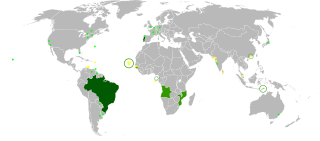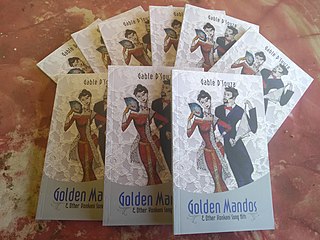
Alisha Chinai is an Indian pop singer known for her Indi-pop albums as well as playback singing in Hindi cinema. She began her singing career with the album Jadoo in 1985, and by the 1990s she had become known as the 'Queen of Indipop'. Her best known songs were with producers Anu Malik and Biddu during the 1990s. Her best known song is Made in India.

Lusophones are peoples that speak Portuguese as a native or as common second language and nations where Portuguese features prominently in society. Is a group of Portuguese-speaking nations that share cultural or historical ties with the Portugal, and which today maintain close political, diplomatic and military co-operation. Comprising an estimated 300 million people spread across 10 sovereign countries and territories, thus called Lusofonia or the Lusophone world, is the community of Portuguese-speaking (Lusophone) world; these include Angola, Brazil, Cape Verde, Galicia, Guinea Bissau, Equatorial Guinea, Macau, Mozambique, Portugal, São Tomé and Príncipe, East Timor, Uruguay, Cochin, Azores, Madeira, Goa, Daman and Diu, Singapore and Malacca to various degrees.

Music of Goa refers to music from the state of Goa, on the west coast of India. A wide variety of music genres are used in Goa ranging from Western art music to Indian classical music. Konkani music is also popular across this tiny state. Being a former territory of Portugal, Goa has a dominant western musical scene with the use of instrument such as the violin, drums, guitar, trumpet and piano. It has also produced a number of prominent musicians and singers for the world of Indian music. Portuguese Fado also has significance in Goa.

Siolim is a village in Bardez taluka, and a census town on the central west coast of India, in the North Goa district of Goa. The 2001 population was 10,311, and 10,936 in 2011. Siolim is also the name of a constituency in the Goa assembly, which includes Assagao, Anjuna and Oxel, in addition to Siolim. A person from Siolim is known as a Siolcar or even as Shivalkar.
Goan Catholics are an ethno-religious community of Indian Christians adhering to the Latin Rite of the Roman Catholic Church from the Goa state, in the southern part of the Konkan region along the west coast of India. They are Konkani people and speak the Konkani language.

Luís Remo de Maria Bernardo Fernandes is a singer and musician from India with naturalized Portuguese citizenship. Known as a pioneer of Indian pop music, he performs pop/rock/Indian fusion and is also a film playback singer. His musical work is a fusion of many different cultures and styles that he has been exposed to as a child in Goa and in his later travels around the world. Such influences include Goan and Portuguese music, Sega music, African music, Latin music, the music of erstwhile European communist states, those of the dance halls from Jamaica and Soca.
Goans is the demonym used to describe the people native to Goa, India, who form an ethno-linguistic group resulting from the assimilation of Indo-Aryan, Dravidian, Indo-Portuguese, and Austro-Asiatic ethnic and/or linguistic ancestries. They speak different dialects of Konkani language natively, collectively known as Goan Konkani. "Goanese" is an incorrect term for Goans.

Lorna Cordeiro, also known as Lorna, is a Konkani singer from the coastal state of Goa, India, and is popularly known as the "Nightingale of Goa".
The Culture of Goan Catholics is a blend of Portuguese and Konkani cultures, with the former having a more dominant role because the Portuguese ruled Goa directly from 1510 to 1961.
Goan Catholic literature is diverse.
Tiatr is a type of musical theatre popular in the state of Goa on the west coast of India as well as in Mumbai and with expatriate communities in the Middle East, United Kingdom and other cities where Konkani speakers have a considerable presence. The dramas are performed mainly in the Roman Konkani dialects and include music, dancing and singing. Tiatr performers are called tiatrists.
Kuxttoba was a Goan who rebelled against the Portuguese rule. He was a member of the Salekar branch of the Rane family. Information about his birth, the reason and the course of his rebellion and the manner of his end are vague. He did rebel as an individual against the rule of the Portuguese in Goa but he presented no concept for an independent Goa. Neither did the Ranes do so when they took to arms against the Portuguese Government in Goa, nor the Sipais (Sepoys) when they mutinied. Kuxttoba was shot dead on 13 June 1871. The official version is that Constâncio de Rosário e Miranda of the 4th Division ambushed and killed him. The popular version is that he was betrayed by his mistress Bulem in exchange for a bribe.
Rajan and Prema is a traditional Konkani duet. The music and lyrics for this song were written by Antoninho de Souza.

O Maria is a Konkani language film released in 2010 in Goa, India. It is the fourth film by Rajendra Talak after the National Award winning Aleesha in 2004, Antarnad in 2006 and Sawariya.com in 2008.

Chris Perry, was an Indian musician, composer, songwriter, and film producer who combined jazz with Konkani music. He was known in India as the 'King of Cha Cha Cha' and the 'Man with the Golden Trumpet', and was the composer of the iconic signature song of All India Radio.
Rosario Alfred Fernandes, better known by his stage name Alfred Rose, was a Goan tiatrist. He was one of the most popular singers and composers of Konkani songs, and is routinely broadcast on the Panaji or Panjim station of All India Radio (Akashvani). He is believed to have sung or composed, or both, around 5000 Konkani songs during his career.

Sonia Shirsat is a Fado singer from Ponda taluka, Goa, India. She has been referred to as "the ambassador of Goan music to the world" and has performed across India and the world and often during cultural and music events in Goa. She sings in 13 different languages Shirsat has been promoting Fado in Goa, by holding training and introductory classes to this form of music at various parts of the region.
Reginaldo Fernandes (1914–1994), better known as Reginald Fernandes was a writer, musician and cultural figure from the world of Goan and Konkani music. He was known for having written a vast number of Konkani romans novels, over a hundred in number. He has been called the "King of Konkani Fiction".








